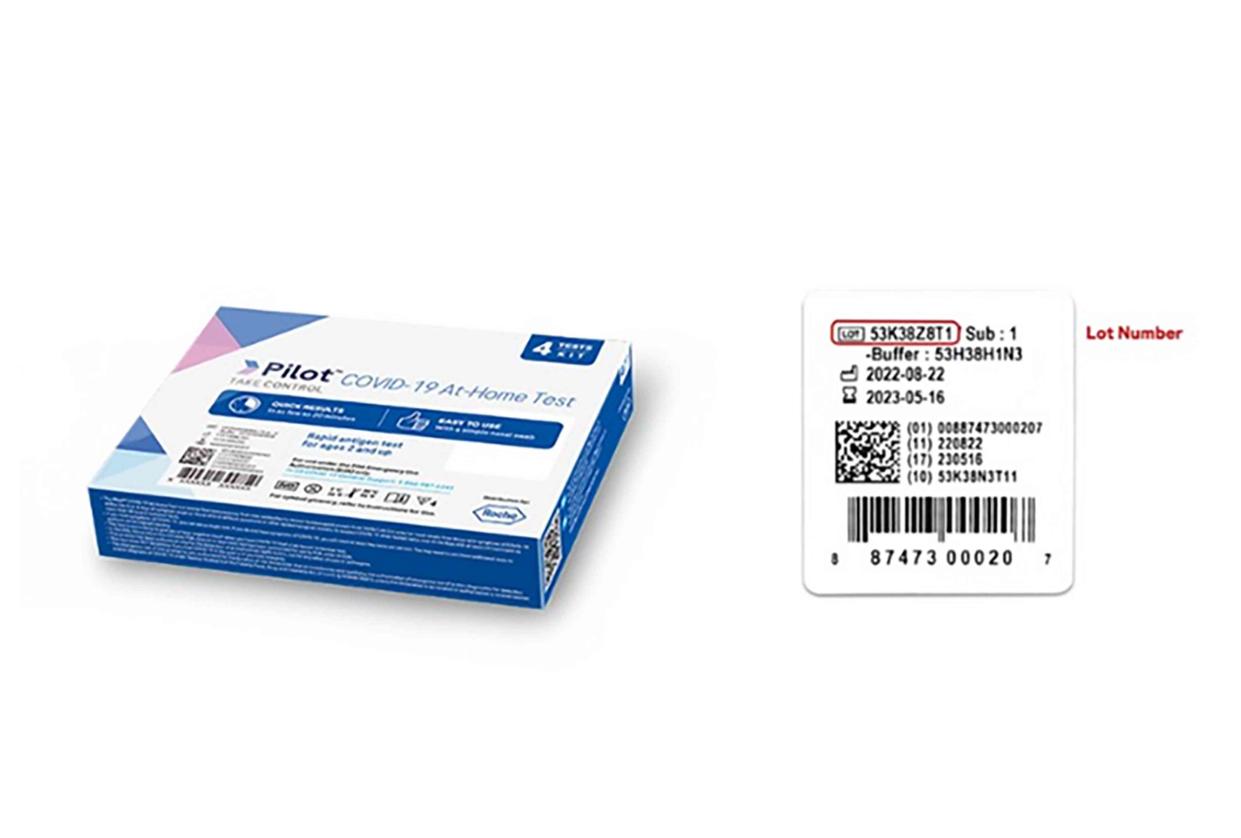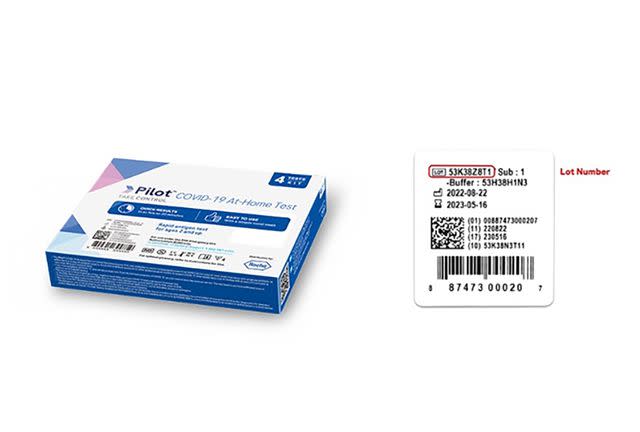More Than 500,000 At-Home COVID Tests Recalled, FDA Warns of Bacteria Risk

Courtesy of SD Biosensor, Inc./FDA
Fact checked by Nick Blackmer
The FDA is warning consumers not to use certain lots of recalled SD Biosensor, Inc., Pilot COVID-19 At-Home Tests.
SD Biosensor, Inc., initiated a recall of more than 500,000 at-home COVID tests due to a bacterial risk.
Contact with the contaminated liquid may pose safety concerns, and the contamination could also impact the accuracy of the tests.
More than 500,000 at-home COVID-19 tests are being recalled due to possible bacterial contamination in the tests’ liquid solution, the Food and Drug Administration announced last week.
The affected tests are the SD Biosensor, Inc., Pilot COVID-19 At-Home Tests, distributed by Roche Diagnostics. The agency urged anyone who bought any test with an affected lot number, listed on the FDA’s announcement, to stop using them and throw them out immediately.
The possibly-contaminated COVID tests were distributed primarily to CVS, but some were also distributed to Amazon. It’s not yet clear how many of these recalled tests were actually purchased by consumers, and the FDA has not yet received any reports of “injuries, adverse health consequences, or death” associated with the at-home tests.
Although the tests were found to be contaminated, the possibility of getting a bacterial infection after using one of these tests is quite low, explained William Schaffner, MD, professor of infectious diseases at the Vanderbilt University Medical Center. The more likely issue is that the contaminated tests may not function properly.
“[These bacteria] are not supposed to be in this liquid, and they might somehow foul up the results of the test. And that would not be a good thing. Either you’ve got a false positive or a false negative test,” Dr. Schaffner told Health.
Here’s what to know about the recalled tests, and what to do if you have any at home.

Courtesy of SD Biosensor, Inc./FDA
Related:What the End of the COVID-19 Public Health Emergency Means for Testing and Treatment Costs
Greater Risk of Inaccuracy Than Illness
It’s not entirely clear how the at-home tests became contaminated, but Dr. Schaffner speculates that there was some sort of issue in the manufacturing process of these tests.
“SD Biosensor Inc., the manufacturer of the Pilot COVID-19 At-Home Test, informed Roche that this issue was identified during routine quality assurance testing,” a spokesperson for Roche, the distributor of the affected tests, told Health.
The FDA said that the liquid in some of these tests was found to contain organisms such as Enterococcus, Enterobacter, Klebsiella, and Serratia, which are all fairly common bacteria. These specific types are found in the intestinal tract of humans and other animals.
“It’s not as though any of these bugs, in and of themselves, are very aggressive pathogens,” Dr. Schaffner said. “These are not the sorts of infections that really are acquired very often in the community.”
However, in some cases, different strains of these bacteria can cause problems such as urinary tract infections or hospital-related infections. Some can also be an indicator of fecal-contaminated water.
In that case, an infection from any of these bacteria can be a concern, especially for people who are immunocompromised. A local infection could spread from a cut to the rest of the body, for example, Dr. Schaffner said.
Still, he added, getting an infection from using these tests is not impossible, but is probably unlikely since people aren’t supposed to be coming into contact with the liquid in a COVID test anyways.
“You’d have to mishandle the test in some way,” he said. “If you got it on your skin, if you had cracks in your skin or cuts or something like that, perhaps one or more of these bacteria could find entrance and give you a local infection.”
The likelier concern is the fact that this bacterial contamination may affect the tests’ ability to detect COVID accurately, though it’s not quite clear yet just how that happens or if the contaminated liquid was more likely to provide false negative or positive results.
“If these bugs can multiply, they can change the chemical composition of the solution that they’re in, and therefore that solution may not work exactly the way it’s supposed to,” Dr. Schaffner added.
Related:The 7 Best At-Home COVID-19 Tests of 2023, Tested and Reviewed
How to Use Tests Safely
The FDA, as well as SD Biosensor and Roche, is urging people to check the lot numbers on their Pilot At-Home COVID Tests to make sure that their products are not among those recalled. They’re also encouraging everyone to throw away any possibly-contaminated tests. The liquid should not be poured down the sink—throwing the entire kit out in the trash is preferred.
If a person has used one of these recalled tests in the past, it’s best to be on the lookout for any possible signs of infection, just to be safe. A fever, red eyes, or any other “concerning symptoms” might indicate that someone needs medical attention.
And if the at-home test was used less than two weeks ago, the FDA recommends retesting since those results may have been inaccurate. If it’s been longer than two weeks, there’s no need.
People can also request a replacement test from Roche, as well as report any suspected issues from using the tests.
The FDA is currently reviewing the recall of these Pilot At-Home tests, and will clarify the specific recall risk in the future. In the meantime, Roche has asked all retailers and distributors of the affected tests to “quarantine” them as the FDA continues to investigate, the company spokesperson told Health.
When it comes to general advice about at-home COVID tests, it’s always important to pay attention to expiration dates and other safety information about the products a person is using. It’s also incredibly important to wash hands before and after using a COVID test, Dr. Schaffner added.
And it’s always good advice, he said, to use the tests as directed.
For more Health news, make sure to sign up for our newsletter!
Read the original article on Health.

